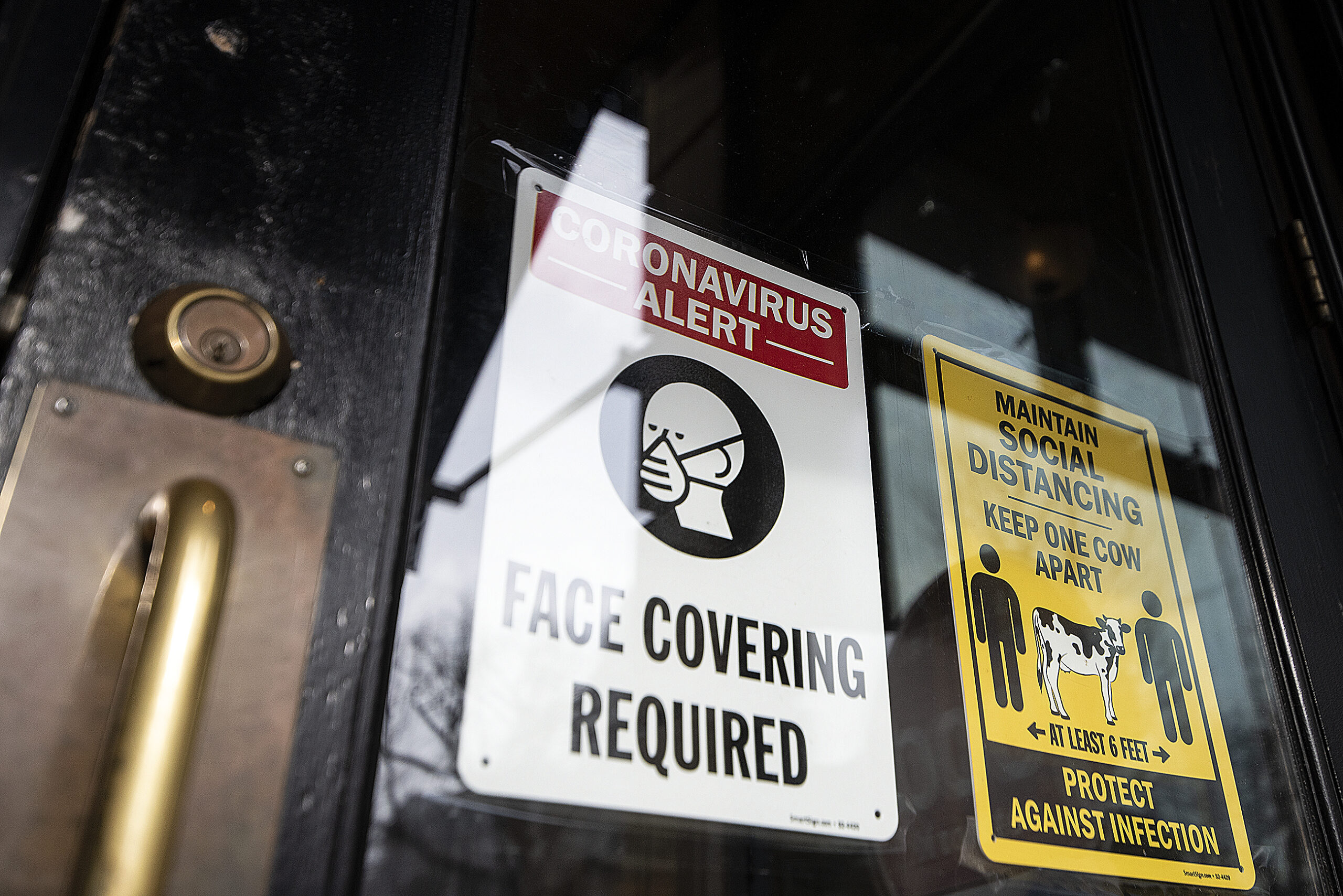The Wisconsin Supreme Court has ruled against Gov. Tony Evers, striking down the governor’s ability to issue repeated emergency declarations related to the COVID-19 pandemic and ending the statewide mask mandate.
The long-awaited decision was released Wednesday morning, more than four months after the court heard arguments in the case. The court ruled 4-3, with all conservative justices in the majority and liberal justices offering a dissent.
“The question in this case is not whether the Governor acted wisely; it is whether he acted lawfully,” conservative justice Brian Hagedorn wrote in the court’s majority opinion. “We conclude he did not.”
Stay informed on the latest news
Sign up for WPR’s email newsletter.
The ruling immediately ends Wisconsin’s statewide mask mandate. Local government mandates, where they exist, can remain in effect.
The lawsuit, brought by GOP donor Jeré Fabick, argued Evers overstepped his powers by declaring multiple states of emergency related to the same issue — the COVID-19 pandemic — without approval from the state Legislature.
Under state law, governors have the power to issue public health emergencies, but those emergencies can only last for 60 days, unless they are extended by the state Legislature. Evers has issued several emergencies related to the COVID-19 pandemic since last March. None of them have been extended by the Legislature.
In the majority opinion, Hagedorn wrote the decision isn’t, and shouldn’t be, about making sure the governor has the power to respond to the pandemic adequately or ensuring executive powers aren’t too expansive — it is, he argued, about whether Evers followed the law.
“Whether the policy choices reflected in the law give the governor too much or too little authority to respond to the present health crisis does not guide our analysis,” Hagedorn wrote. “Our inquiry is simply whether the law gives the governor the authority to successively declare states of emergency in this circumstance.”
Evers, who was represented by the state Department of Justice in the case, argued his repeated declarations were warranted, as the pandemic has evolved and posed different threat levels since its appearance in the state last spring.
In the court’s dissent, liberal justice Ann Walsh Bradley agreed with that argument.
“(The) Governor has not extended a pre-existing state of emergency, but instead has issued new emergency declarations based on new underlying occurrences,” Bradley wrote.
She argued the majority’s opinion would block the governor, and future governors, from issuing necessary emergency declarations related to the COVID-19 pandemic or other emergencies in the future.
“Imagine heavy rains leading to a flood that two months later causes a dam to break. If the governor declared a state of emergency because of the initial flooding, he could not issue another for the new flood caused by the dam failure because it shares an underlying cause with the previous state of emergency,” she wrote of the majority opinion. “Surely, when enacted, the legislature could not have intended (the law) would be interpreted to place such a roadblock to effective governmental response to a worldwide pandemic.”
The governor also pointed out state lawmakers have the power to revoke an emergency declaration if they want, a step GOP leaders didn’t choose to take until February. Evers immediately issued a new order following the repeal.
In a statement following the ruling, Evers urged Wisconsinites to continue wearing masks to slow the spread of the virus and save lives.
“Since the beginning of this pandemic, I’ve worked to keep Wisconsinites healthy and safe, and I’ve trusted the science and public health experts to guide our decision making,” Evers said in the statement.”Our fight against COVID-19 isn’t over — while we work to get folks vaccinated as quickly as we can, we know wearing a mask saves lives, and we still need Wisconsinites to mask up so we can beat this virus and bounce back from this pandemic.”
Meanwhile, the GOP leaders of the state Legislature lauded the opinion.
Assembly Speaker Robin Vos, R-Rochester, argued people should be allowed to make their own decisions when it comes to wearing a face covering.
“The Wisconsin Supreme Court confirmed what we already knew,” Vos said in a prepared statement. “Governor Evers exceeded his authority by issuing multiple emergency orders without consulting the legislature. People and businesses are free to make decisions based on what’s best for them and don’t need state government telling them how to live their lives.”
Senate Majority Leader Devin LeMahieu, R-Oostburg, said the ruling “upholds the separation of powers and the rule of law.”
“The Governor’s repeated abuse of emergency powers and pervasive violation of state statute created a state of chaos and had to be stopped,” LeMahieu said in a prepared statement. “The Legislature exercised its authority to revoke Governor Evers’ order in February, and today the Court handed down the final rebuke of the Governor’s illegal actions.”
In addition to striking down the statewide mask mandate, the decision puts tens of millions of dollars a month in federal food aid to Wisconsin at risk. A state must have a pandemic emergency declaration in place to receive the funding. According to a memo from the Legislature’s nonpartisan budget office, about 242,000 households in Wisconsin received about $49 million in additional federal food aid in January.
Wednesday’s ruling is not the first time the court has significantly reined in Evers’ authority during the pandemic. Last May, the court’s conservative majority struck down his administration’s “Safer at Home” order, which put statewide limits on gatherings and businesses.
Local Governments Respond
In February, cities like Eau Claire and Superior took action to prepare local mask orders and ordinances that would go into effect if the statewide mask mandate was struck down.
Eau Claire City Attorney Stephen Nick said the local ordinance carries a potential $200 citation for those refusing to wear masks in indoor public spaces in the city.
“So with the decision issued by the Wisconsin Supreme Court this morning, our city ordinance now comes into effect,” said Nick. “But it’s an ordinance that has requirements that closely mirrored the state face covering or mask order. So I don’t think people will experience much of a change.”
Nick said because the Eau Claire mask mandate carries the weight of local law, he’s confident it would be upheld if challenged in court.
Last summer, the Green Bay City Council passed a facemask ordinance, which expired Wednesday. In an interview with WPR, council member Randy Scannell said there will be a special meeting Thursday to determine whether to extend it in light of the court’s ruling.
“It’s unfortunate that this has become a political battle, that we’re not following the science,” said Scannell. “It’s just so frustrating having to fight these same fights again and again and again.”
Scannel said having a statewide mask mandate is more effective than a patchwork of local ordinances because “a pandemic doesn’t recognize municipal boundaries.”
Other cities with mask ordinances or health orders include Milwaukee, Oshkosh and De Pere.
In an email response to WPR, Wisconsin League of Municipalities director Jerry Deschane said the organization doesn’t have any specific comments on the ruling but said local governments “do have emergency powers to act to protect public health if necessary.”
The Wisconsin Counties Association declined to comment on the ruling but noted Ashland, Bayfield, Dane, Door, Eau Claire, Rock and Winnebago counties have enacted local mask mandates. In a press release sent to WPR, Wednesday, Outagamie County Public Health Officer Natalie Vandeveld announced that a local mask mandate will go into effect April 1.
Dane County Executive Joe Parisi said the local mask order issued by Public Health Madison and Dane County is currently being challenged in court but, “we feel that we’re on strong legal ground.”
“It’s unfortunate for the state as a whole,” Parisi said of the court’s decision. “I’m sure there will be some spillover potentially in, you know, additional infections into Dane County because of people in other counties not masking up.”
Wisconsin Public Radio, © Copyright 2025, Board of Regents of the University of Wisconsin System and Wisconsin Educational Communications Board.





